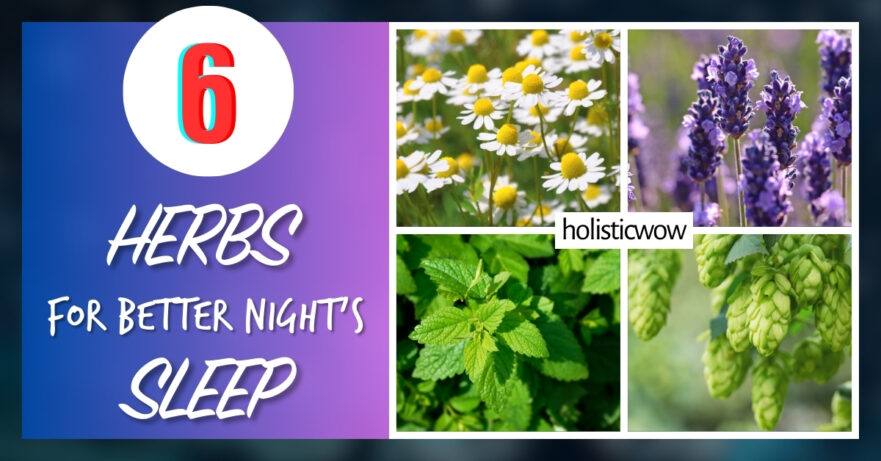In this article about herbs for sleep:
🌿 Herbal Solutions for Better Sleep | ☯️ Balanced Herbal Blends for Restful Nights | 💤 Herbal Routines for Better Sleep | 🌱 Navigating Herbs Safely
Ever toss and turn at night, wishing for sleep to come?
Many face this, trying to quiet our busy minds when we only want to drift off. While there are plenty of modern sleep aids out there, have you considered reaching for something more natural?
We’re talking about the power of herbs like chamomile, lavender, and valerian — nature’s own sleep helpers. These aren’t just old tales; they’re proven by time to help us relax and find that peaceful sleep we crave.
So, let’s dive into how these gentle herbs can make our nights more restful. From lavender’s calming scent to chamomile tea’s soothing taste, we’ll explore simple, natural ways to welcome sleep.
Key Takeaways
- 🌿 Broad spectrum of herbs: Harness the unique qualities of six herbs—chamomile, lavender, lemon balm, passionflower, hops, and valerian root—for a comprehensive approach to improving sleep and reducing stress.
- 🌀 Select the right blend: Tailor your nighttime routine with herbal blends from Evening Whisper to Nightfall Elixir, aligning with your sleep needs to ensure a smooth transition into rest.
- 🌜 Holistic approach to sleep: Enhance the effectiveness of herbal sleep aids by practicing good sleep hygiene, including maintaining a consistent sleep schedule and creating a restful environment.
🌿 Herbal Solutions for Better Sleep
Managing stress and improving sleep quality is critical for overall well-being in today’s fast-paced environment. Herbs such as chamomile, lavender, lemon balm, passionflower, hops, and valerian root offer natural solutions for these common concerns.
Rooted in ancient traditions and supported by modern experiences, these herbs provide a holistic approach to calming the mind, enhancing mood, and promoting restful sleep.
Each herb possesses unique properties that contribute to relaxation and a better night’s sleep, making them invaluable tools to pursue a more balanced and peaceful life.
Chamomile
Chamomile has been a source of calm since ancient Egypt, offering a pathway to relaxation and sleep. Steeping its flowers in hot water releases apigenin, an antioxidant that can engage with brain receptors to diminish anxiety and assist in easing into sleep. Chamomile is a comforting presence, leading into a night of peaceful rest.
Lavender
Lavender, known for its beautiful scent and vibrant purple hue, has historically symbolized serenity. According to some studies, its aroma is not just pleasing to the senses but is believed to have a calming effect on the nervous system, potentially reducing heart rate and blood pressure to help prepare the body for sleep. Imagine it as a soft whisper in the night, telling your body it’s time to rest, making it an ideal companion in your bedtime routine, whether through essential oils or a dried sachet under your pillow.
Lemon Balm
Lemon balm, with its lemony scent and flavor, brightens the spirit while calming the mind. This herb is known to work wonders for those seeking refuge from the day’s stress, enhancing mood and mental clarity. According to research, lemon balm is believed to contribute to stress relief by impacting the GABA system, potentially enhancing mood and mental clarity. It’s like a breath of fresh air in your evening routine, offering clarity and peace before you drift off.
Passionflower
Passionflower, with its intricate flowers, significantly impacts sleep and anxiety management. It is known to enhance GABA levels in a way that is beneficial for calming active minds in the night’s stillness. Passionflower supports deep and restorative sleep. However, pregnant and breastfeeding women should avoid its use, and it may interact with sedatives and anticoagulant medications.
Hops
Hops, more commonly associated with brewing, also possess a hidden talent for inviting sleep. The compounds that add bitterness to beer are known to act as natural sedatives when taken in other forms. They work in harmony with other sleep-inducing herbs, especially valerian, to deepen the quality of rest, making it easier to fall and stay asleep. However, the sedative effects of hops are best realized when used with other herbs.
Valerian root
Valerian root, recognized for its rich, earthy aroma, has been a long-standing remedy for sleep. Its sedative effects have been well-documented since ancient times. Valerian root is widely used for its potential to aid sleep, with research suggesting it might influence the brain’s sleep mechanisms. Utilizing valerian in tea or as a supplement could benefit those facing insomnia, providing a solid basis for deep, continuous sleep. It’s important to note that valerian may take a few weeks to show benefits and, like any supplement, should be used under the guidance of a healthcare provider to avoid potential interactions with other medications.
Balanced Herbal Blends for Restful Nights
Crafting the perfect herbal blend can be likened to orchestrating a symphony — each herb contributes its unique note toward the harmonious goal of relaxation and sleep.
Below, we explore multi-component herbal blends that range from mild and soothing to strong and potent, designed to cater to varying degrees of restlessness and insomnia.
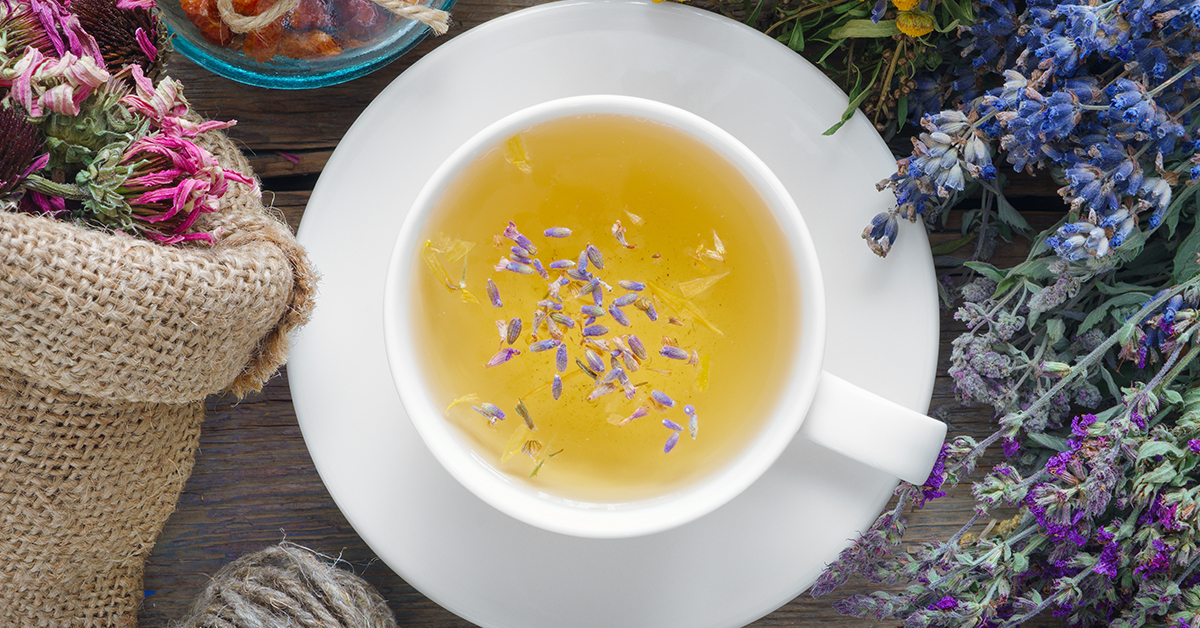
Evening Whisper Blend
Ingredients (for a single serving):
- 1 teaspoon dried chamomile flowers,
- ¼ teaspoon dried lavender,
- 1 cup of boiling water.
Preparation:
- Mix the chamomile and lavender in a mug.
- Pour boiling water over the herbs and let steep for about 10 minutes.
- Strain and enjoy this blend in the early evening to set a tranquil tone for the rest of the night.
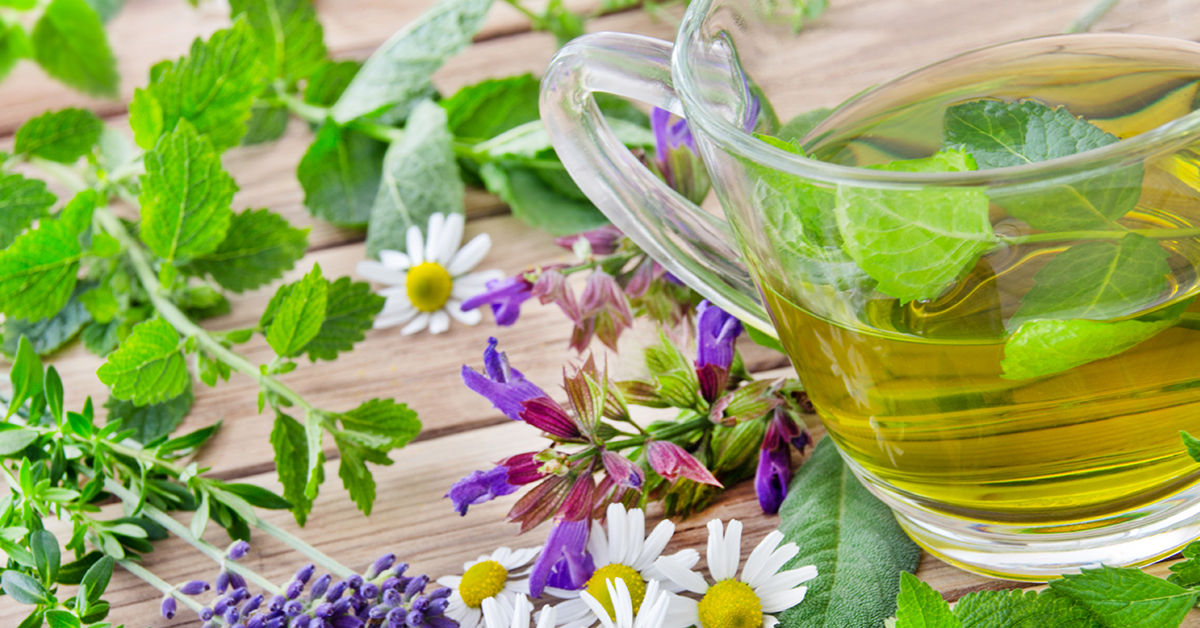
Serenity Now Tea
Ingredients (for a single serving):
- 1 teaspoon dried chamomile flowers,
- ½ teaspoon dried lemon balm leaves,
- ¼ teaspoon dried lavender,
- 1 cup of boiling water.
Preparation:
- Combine lemon balm, chamomile, and lavender in a teapot.
- Add boiling water and steep for 10-15 minutes.
- Strain into your favorite cup.
This blend is perfect for unwinding after a busy day, with a slightly stronger calming effect to ease into the evening.
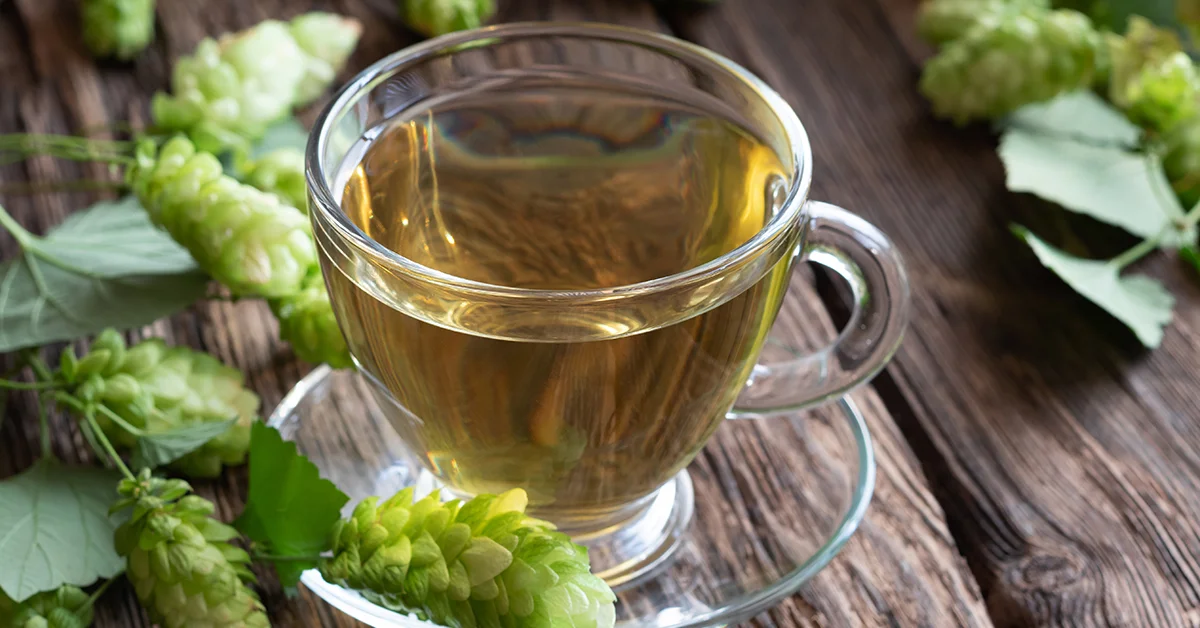
Moonlight Sonata Blend
Ingredients (for a single serving):
- ½ teaspoon dried passionflower,
- ½ teaspoon dried hops,
- ½ teaspoon dried lemon balm leaves,
- 1 cup of boiling water.
Preparation:
- Blend passionflower, hops, and lemon balm in a mug.
- Pour boiling water over the mixture and steep for 15 minutes, covered.
- Strain and drink approximately an hour before bedtime to encourage deeper sleep.
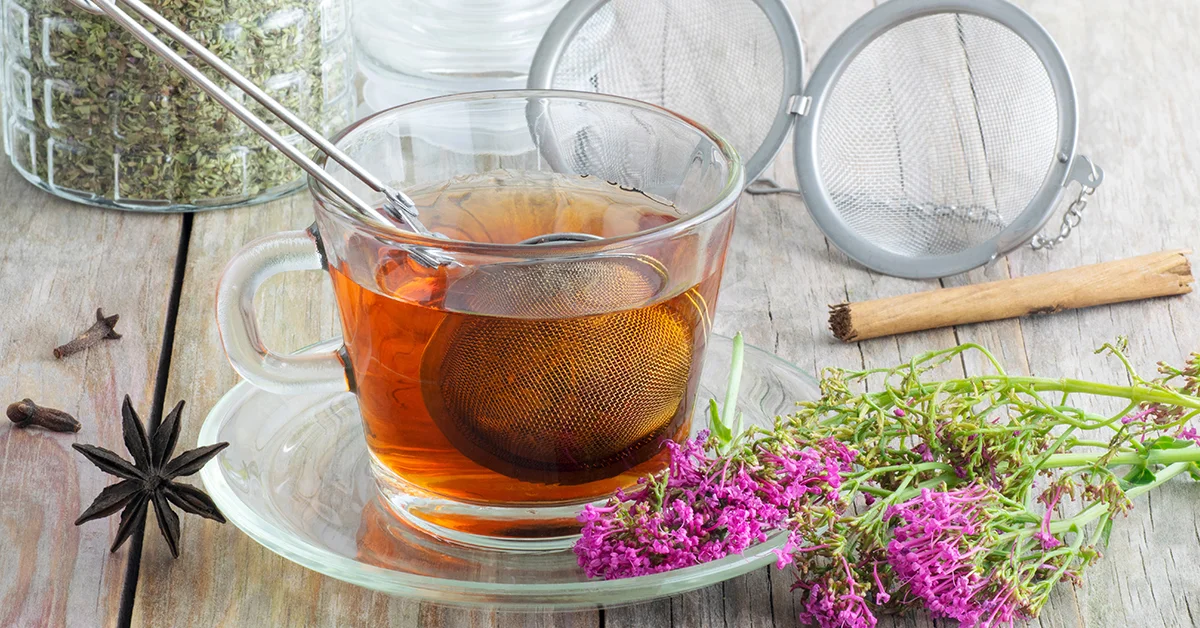
Deep Slumber Brew
Ingredients:
- ½ teaspoon dried valerian root,
- ½ teaspoon dried hops,
- ½ teaspoon dried chamomile flowers,
- ¼ teaspoon dried lavender,
- 1 cup of boiling water.
Preparation:
- Combine valerian, hops, chamomile, and lavender in a teapot.
- Pour boiling water over the herbs and let steep for 15 minutes.
- Strain into a mug and consume 30 minutes before bed.
This powerful blend is designed for those who struggle to fall asleep and offers a potent invitation to sleep.
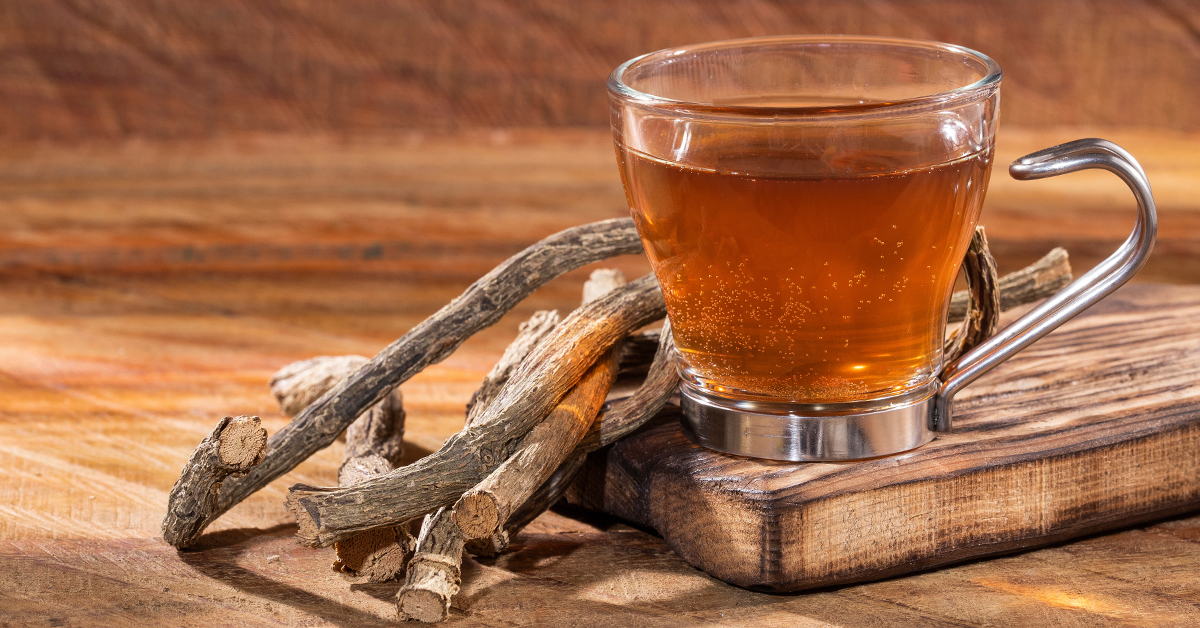
Nightfall Elixir
Ingredients:
- ½ teaspoon dried valerian root,
- ½ teaspoon dried passionflower,
- ¼ teaspoon dried hops,
- ¼ teaspoon dried lemon balm,
Preparation:
- Mix valerian root, passionflower, hops, and lemon balm in a cup.
- Add boiling water and steep for 15-20 minutes. Strain and sip slowly before bedtime.
This elixir represents the strongest blend, ideal for nights when the mind refuses to quieten and sleep is most elusive.
These blends offer a natural spectrum from gentle relaxation to profound sedation.
Herbal remedies work best when integrated into a holistic approach to sleep hygiene, including reducing screen time before bed, maintaining a consistent sleep schedule, and creating a comfortable sleep environment.
As individual responses to herbs can vary, start with smaller doses to gauge your sensitivity and consult a healthcare professional if you have underlying health conditions or are taking other medications.
Herbal Routines for Better Sleep
Incorporating herbal remedies into your daily life can enhance your well-being and improve your sleep.
While each of these blends offers unique benefits, choosing wisely based on your specific needs for the evening is important.
Not all blends are meant to be used together or on the same night. Select and infuse the blend that best aligns with how you feel and what you need to ensure a peaceful transition into a restful sleep.
Daily Herbal Integration for Restful Nights
- 🫖 Unwinding after a busy day: The Evening Whisper Blend, with its chamomile and lavender ingredients, serves as a perfect prelude to the evening. To enhance its effects, consider enjoying this blend in a quiet space where you can reflect on the day or read a few pages of a calming book. The ritual of preparing and sipping this tea can become a signal to your body that it’s time to start winding down.
- 🧘♀️ Preparing for deep rest: The combination of passionflower, hops, and lemon balm in the Moonlight Sonata Blend is crafted to deepen relaxation as bedtime approaches. Make this blend more effective by creating a bedtime ritual around it, such as dimming the lights, playing soft music, or practicing gentle stretching or breathing exercises. This can help maximize the blend’s calming effects on the mind and body.
- 🕯️ Support for restless nights: The potent mix of valerian root, hops, chamomile, and lavender in the Deep Slumber Brew is your ally for nights when sleep seems elusive. To complement this blend, ensure your sleeping environment is optimized for rest — consider using blackout curtains, maintaining a cool room temperature, and turning off electronic devices at least an hour before bed to encourage a deeper state of relaxation and sleep readiness.
- 💭 Quieting an active mind: On particularly restless nights, the Nightfall Elixir can provide strong support for entering a state of deep sleep. Pairing this elixir with a journaling practice can be beneficial. Before bed, write down any lingering thoughts, worries, or to-dos for the next day to clear your mind and ease into sleep more peacefully. This practice, combined with the elixir, can help quieten an active mind and promote a more restful night.
Complementary Practices for Enhanced Calm
- 🌬 Aromatherapy: Incorporate lavender essential oil into your daily routine through diffusers or personal inhalers. The scent of lavender has been associated with reduced anxiety and improved sleep quality, making it perfect for use throughout the day and in preparation for sleep.
- 🛀 Herbal baths Once or twice a week, indulge in a warm bath infused with hops and lavender. The warmth of the water, combined with the relaxing properties of these herbs, can soothe muscular tension and promote a state of deep relaxation.
- 🥬 Dietary mindfulness: Complement your herbal regimen with foods rich in magnesium and omega-3 fatty acids, which are known to reduce anxiety and support overall brain health. Almonds, spinach, and fatty fish are excellent choices.
- 🚶 Mindful movement: Incorporate gentle yoga or stretching into your evening routine. Physical activity can enhance the effects of herbal remedies by relieating stress and preparing your body for a restful night.
Integrating these herbs and practices into your daily life doesn’t require a radical overhaul of your routine. Small, consistent changes can yield significant benefits, transforming your relationship with sleep and stress. Remember, the key to these practices is mindfulness and consistency.
🌱 Navigating Herbs Safely
Starting with small doses is the first step when you’re adding herbal remedies to your health routine.
This approach lets you see how you respond and adjust amounts for the best effect, keeping safety in mind. While many herbs are safe, everyone’s body reacts differently. If you notice any side effects, it’s important to stop and think about what might be causing them.
Remember, herbs can sometimes interact with prescription medicines. These interactions might make your medicines work too well or not well enough, which is why talking to a healthcare provider or an herbalist is essential. This is especially crucial if you’re pregnant, breastfeeding, taking medications regularly, or have an existing health condition. Getting advice tailored to your situation can help you avoid any unnecessary risks.
For kids and older adults, being extra careful with herbs is important. Their bodies might react more strongly to herbal remedies, and the chance of side effects or interactions could be greater. Before giving herbal treatments to children or elderly family members, getting advice from a professional is a must to ensure their safety.
By being cautious and seeking expert advice when needed, you can make herbal remedies a safe part of your wellness plan. This careful approach allows you to enjoy the benefits of herbs while keeping yourself and your family safe.
Sleeping is crucial; natural remedies like chamomile, lavender, and valerian root can help. This post explores how these herbs and others can be used in blends to promote better sleep and reduce stress. We discuss specific blends for evening use, emphasizing the importance of choosing the right one based on your needs to enhance relaxation and sleep quality.
It’s important to start with small doses of these herbal remedies to monitor your body’s reaction, especially since individual responses can vary and interactions with medications may vary. Consulting healthcare professionals is advised, particularly for pregnant individuals or those on medication.
Incorporating herbal blends into your routine, alongside healthy habits like aromatherapy and mindful dietary choices, can support your journey toward improved well-being and peaceful sleep. Consistency and mindful use of these herbs are key to enjoying their full benefits.
FAQ
Can I use these herbal blends every night?
Yes, you can use these herbal blends nightly, but listening to your body and adjusting as needed is important. Herbs like chamomile and lavender are gentle and generally safe for daily use. However, more potent herbs such as valerian root may be best used on nights when you particularly struggle to sleep. Consistent use of milder blends can support regular sleep patterns but ensure you're not becoming overly reliant on stronger sedatives. Monitoring your sleep quality and how you feel during the day can help you determine the right balance for your needs.
Are these herbal remedies safe for everyone?
While herbal remedies are natural, they're not suitable for everyone in every situation. Pregnant and breastfeeding women should be cautious and typically avoid most herbs unless advised otherwise by a healthcare professional. Children and older people may also respond differently to herbs, and some may be contraindicated for them. Additionally, if you're taking medication, particularly for sleep, anxiety, or other chronic conditions, you should consult with a healthcare provider to avoid potential interactions. Always start with smaller doses to see how you react before fully incorporating an herbal remedy into your routine.
How can I ensure the best results from using these herbal blends for sleep?
For the best results, integrate these herbal blends into a comprehensive sleep hygiene routine. This includes maintaining a consistent sleep schedule, ensuring your sleeping environment is conducive to rest (cool, dark, and quiet), limiting screen time before bed, and avoiding caffeine and heavy meals in the evening. Incorporating relaxation techniques, such as gentle yoga or meditation, before bed can also enhance the effects of herbal remedies. Remember, while these herbs can significantly aid sleep, they work best in conjunction with healthy lifestyle choices.
